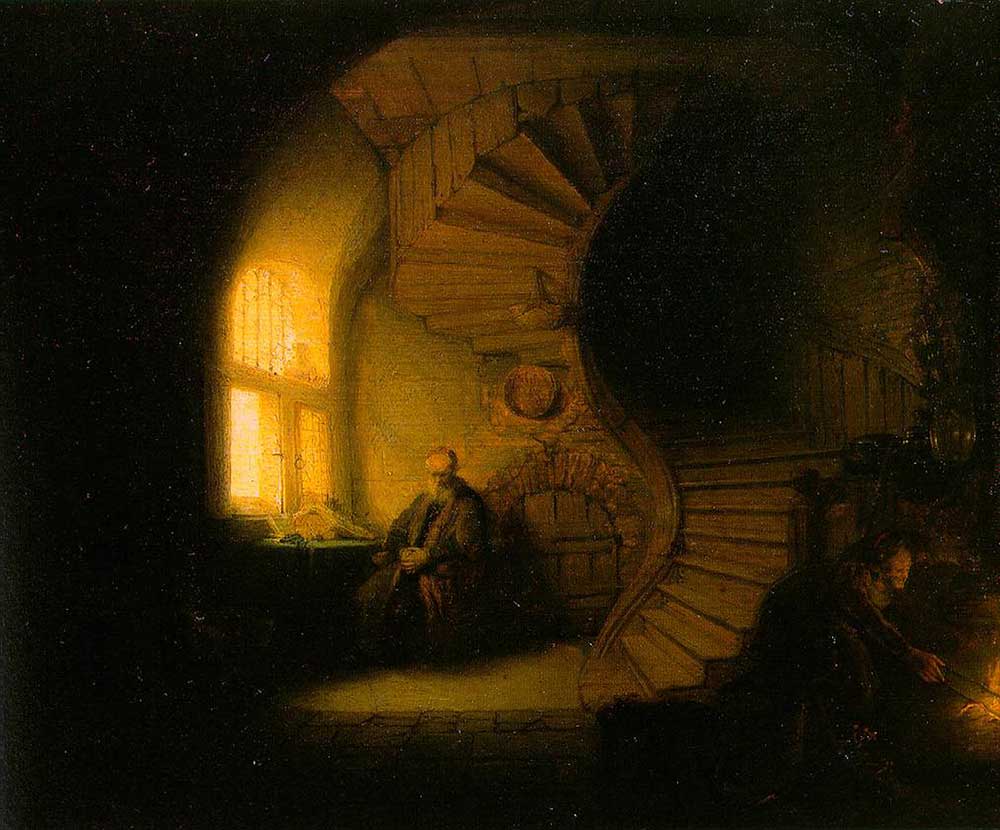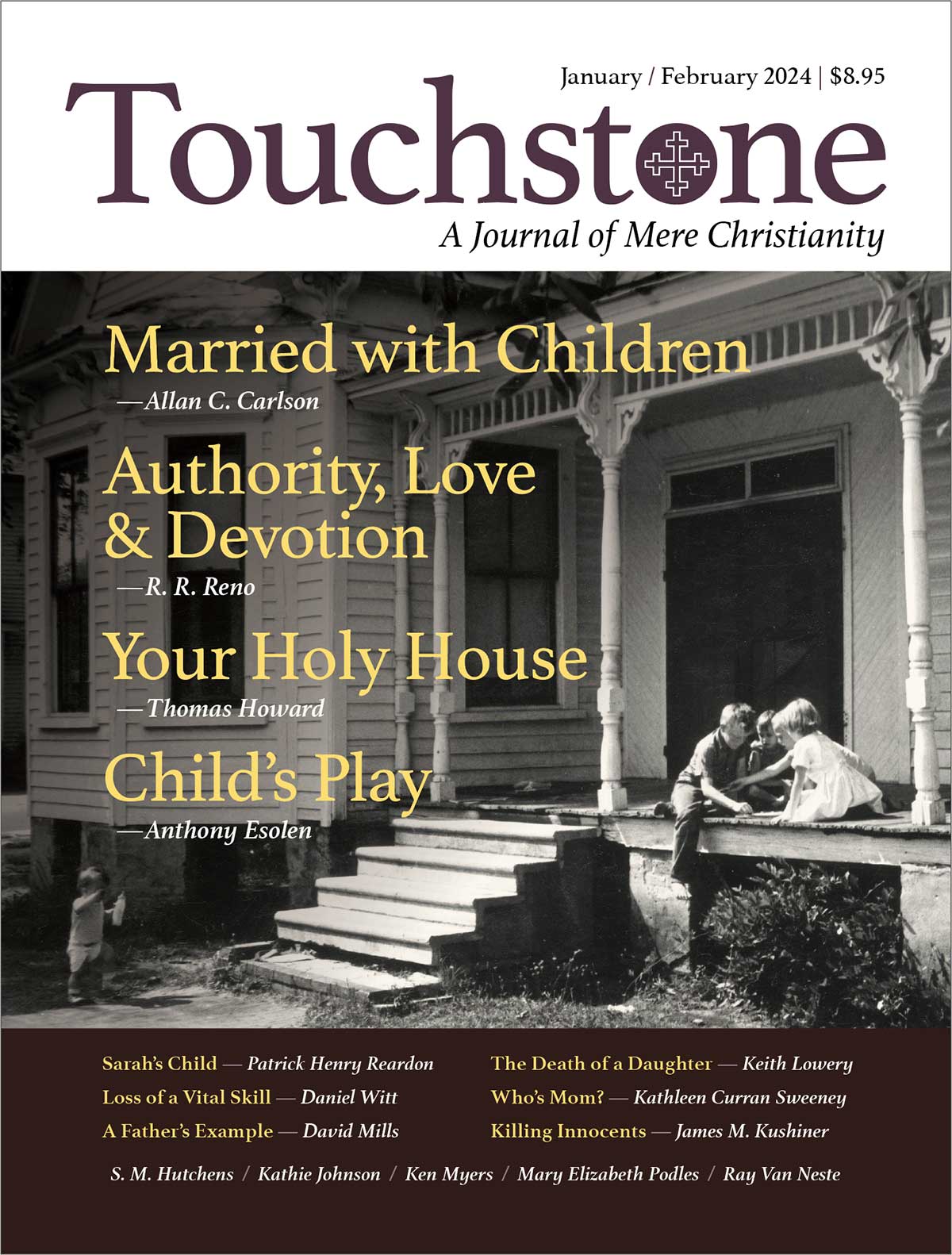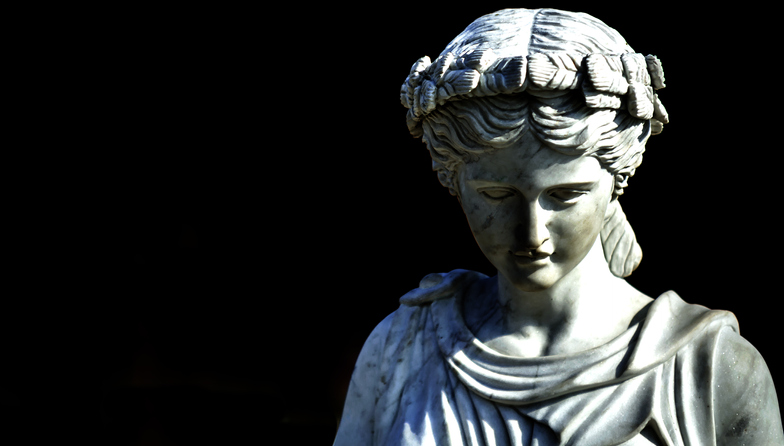Authority, Love & Devotion
What God Has Joined We Must Stop Separating
It’s not common to speak of authority and love in the same breath. That’s a shame, because they’re closely related. Moreover, I will also argue that today’s crisis of authority runs in tandem with the rise of a loveless society. Expertise has replaced authority. As a consequence, a culture of utility is waxing, while the older culture of love’s adventures and devotion’s embrace is waning. Thus my agenda: to clarify the profound consequences of the modern eclipse of authority, and to suggest how we can recover authority’s power, which seduces, as it were, rather than coerces.
Love’s Quest
In his insightful essay on the virtue of love, Josef Pieper defines love as a disposition of affirmation. One says to the beloved, “It is good that you exist.” Most of our affirmations are contingent. I appreciate a good glass of wine for its pleasant taste and the way it makes my heart glad, as the Scriptures often put it. My fondness for rickety old cars has a similar quality. I cherish their discomfort, and even their unreliability, as visible signs of my resistance to the empire of utility that grows stronger by the day.
I could go on with other examples. But it is sufficient to note that these affections are instrumental. They are akin to what Aristotle calls useful friendships. For the most part, in the English language we use “like” to describe these kinds of affirmations, and reserve the word “love” for deeper and more profound attachments, the kind that arise when we affirm something for its own sake. I may say that my wife is smart, beautiful, entertaining, patient, and more. But if I were to tell her that I love her because of those qualities, she might wonder if old age or ill temper or some other falling-away from these admirable qualities would cause me to withdraw my love. By contrast, the most powerful love simply says, “I love you,” without explanation or qualification. This directness is what Pieper means when he says love is a plenary affirmation: “It is good that you exist.” We rejoice in that which we love, not for the sake of something else, but simply for its own sake.
Pieper dwells on love’s affirmation, but it is important to note that love is not a self-moving power. The beloved is not an inert entity on which I somehow confer importance by my love. To the contrary: the objects of our love have great power. They evoke affirmation and exultation. We are lured, even seduced. As St. Augustine observed, our love is our weight. By this metaphor he indicates that we seek that which we love, or, to put it more strongly, we live for and serve that which we love. Romantic literature often depicts love as a panting desire, even to the point of inducing irrational, slavish devotion.
The image of enslavement is not limited to our captivity to erotic desire. St. Paul calls himself a slave of Christ. Faith’s obedient devotion frees him from the tyranny of sin and death. A common petition goes as follows: “Kindle in us the fire of your love.” We are asking God to instill in us a love so strong that it will consume our self-love, allowing us to die to ourselves so that we might live to worship, honor, and obey the Lord. The basic dynamic of death to self toward the end of a perfect obedience characterizes every love that seeks the beloved for its own sake. In Plato’s dialogues, Socrates teaches that a love of truth requires us to harken to that which truth demands, an obedience that breaks the bonds of convenient conventions and comfortable opinions. Artists often testify that beauty is a stern taskmaster. In a real sense, therefore, and not just metaphorically, the objects of our love issue commandments. To love is to serve, and to rejoice in our service. We seek to obey the dictates of that which we love, not because we are compelled by external threats or inducements, but because doing so is our heart’s desire.
Authority’s Roots
At this point, we are beginning to entertain the main theme of this conference, that of authority. It is common (and fitting) to contrast power with authority. Power is concerned with outcomes, not with our hearts. Power cares not at all whether our obedience is joyful or grudging. It operates with carrots and sticks to get results. In contrast, authority operates in the same fashion as the objects of our love. It does not coerce. It commands without bodily threats or worldly inducements. Authority’s method is to win a willing and happy assent.
Less often observed, but equally important, is the contrast between persuasion and authority. To be sure, one can make arguments on the basis of premises derived from authorities. But authority speaks for itself, as it were; it does not rely on arguments. St. Thomas notes that reason can discern the fittingness of God’s revelation in Christ, but it cannot show its necessity. Therefore, one rightly says that authority is the beginning and end of the reasoning and rhetoric used to convince and persuade. Here again we seek the connection between love and authority. As Pascal observed, “The heart has its reasons that reason does not know.”
Let me make this point somewhat differently. Persuasion presumes equality. You and I enter into the give-and-take of argument without the presumption that one or the other has an upper hand on truth. Both Jürgen Habermas and John Rawls based their conceptions of an ideal liberal democracy on public deliberation limited to rational argument and justification without appeal to any metaphysical givens. Authority, by contrast, sets the parameters of deliberation. One can debate the proper interpretation of the authorities that govern the goals, shape, and limits of public life. But authority, as authority, is rich in metaphysical content. It commands obedience out of its inner plentitude of being (if I may use that enigmatic word).
Let me give an example from our own system of government. Congress is our law-making body. Elected officials deliberate and decide upon legislation. (At least that’s the ideal model.) The executive branch possesses the coercive power to ensure compliance with the laws made by the legislature. The president is the commander-in-chief, not just of our military forces but of our entire apparatus of law enforcement (the executive branch houses the CIA, the FBI, and the Department of Justice). And yet, the Supreme Court provides the authoritative interpretation of the constitutional legitimacy of the actions of both the legislative and executive branches.
How is this possible? How can nine unelected men without control of any instruments of coercive power impose their judgments—which they invite no one to debate or modify? The answer, of course, is that the Court possesses the majestic authority of the rule of law, and this authority bears down upon willful legislators and agents of administrative fiat, compelling their obedience.
This account describes the Supreme Court’s authority; it does not illuminate its source. To do this, we need to ponder authority’s etymology. Authority transliterates the Latin auctoritas, which derives from the verb augere, to augment, or build upon. In other words, unlike power, which possesses within itself its own justification (see the ancient adage: “might makes right”), political authorities such as courts of law, as well as many other social and cultural authorities, are not sui generis. These authorities are themselves servants of something more fundamental.
Rome, Athens & Jerusalem
In the West, there have been three different accounts of what is “more fundamental.” The Roman world held that political and cultural authority was rooted in piety toward the founding deeds of that great city. The sheer weight of what had been done in the past anchored tradition. Legitimate authority could build upon this inheritance, but it was powerless to change the founding deeds. Put more generally, the wellspring of authority is that which is old. Antiquity and long usage make things venerable, which is to say that inherited institutions and practices should be venerated. Edmund Burke was perhaps the most eloquent modern spokesman for this view of authority.
The second account arises in Athens. In Aristotle’s account, nature is a dynamic, metaphysically charged reality rather than the largely inert world of “facts” that modern scientism depicts. Insofar as political and social authorities harken to nature’s inner structure and logic, they are legitimate. A paterfamilias, a teacher, and a ruler receive due obedience because their judgments and commands accord with nature’s patterns and purposes. Put succinctly, authority is rightly obeyed because it rules our lives in accordance with nature. Plato presents a more complex and elusive vision, but he, too, anchored authority in the deepest truth of things.
A glib account of ancient philosophy holds that Socrates gave priority to reason. But this is to turn the means into the end. Consider Plato’s dialogues. They consistently portray Socrates reaching the end of the back-and-forth of rational inquiry only to shift to story and myth, raising our minds to that which can only be received as a vision, not arrived at as a conclusion to an argument. Plato, like Aristotle, held that authority builds upon the “real,” a power as mysterious as the past. In my estimation, Martin Heidegger is the most profound modern spokesman for this source of authority.
We find the third account in Jerusalem. Both Testaments of Scripture depict the authority of tradition, and in that sense sound like Rome, as well as the authority of creation, which chimes with Athens. But both are rooted in the transcendent power of God, who is not shy about speaking his mind, commissioning emissaries, and issuing commandments. As the very first Psalm stipulates, blessed is the man who does not walk in the counsels of the wicked but delights in the law of the Lord. In all that he does he prospers. While the wicked are like chaff in the wind; their way will perish. In the Jewish and Christian conception of authority, nothing will prosper that does not augment, does not build upon, that which God has determined and ordained. When I was a young student, Karl Barth helped me see that God is an authority, the authority to be obeyed, not an idea to be entertained or someone to turn to for warm feelings.
Attraction & Obedience
Obedience to authority operates in a fashion similar to love’s desire for union with the beloved. Both are responses to something that compels us, not with carrots and sticks, but through an attraction that wins our hearts and arouses our devotion.
This obedience is not always happy at first. I’ve known people who have fallen in love against their wills. Midway through their graduate studies or just as they are poised to take an important promotion that requires changing cities, they tell themselves, “This is not a good time.” The same goes for authority. Children resist parents, students bridle at the demands made by teachers, and ever since Adam and Eve disobeyed, men and women have done their best to evade God’s commandments.
Of course, there are times when we should disobey, because institutions that claim authority may use their social power in false and perverted ways. Yet, like love, which can also be disordered and misleading, obedience to authority is the path to great joy, because, like love’s urgent demands, it guides us toward union with what we truly desire, which is to honor and serve that which is worthy of our unflagging devotion. Put simply, authority, like love, gets us outside ourselves. It commands, and commandments willingly obeyed, like love’s desire, break the bonds of self-love.
Authority of the Future
Seventy years ago, Hannah Arendt wrote, “Authority has vanished from the modern world.” It seems an odd thing to have said in 1954, given the still-powerful moral consensus that dominated American society at that time, as well as Cold War patriotism and the surge in religious observance after World War II. Yet Arendt saw something at work in the mentality of modern thinking. Distrust of established authorities, especially Christian ones, goes back to Machiavelli, she argued. This skeptical disposition gained momentum in the modern era, epitomized by the three figures whom Paul Ricoeur dubbed the Masters of Suspicion: Marx, Nietzsche, and Freud. In different but interlocking ways, they “unmasked” received wisdom and inherited authorities, showing them to be tools of oppression.
Suspicion can put a check on naiveté and credulity, but it can serve the cause of true love and ennobling loyalty only in small doses. When a culture turns critical “unmasking” into a cardinal virtue, life’s anchors become unsteady. As I’ve noted, authority builds upon—augments—something deep and mysterious, a power or reality that cannot be proven or captured in a formula. A scientific and progressive culture has no place for such powers and realities. Max Weber thought that the rejection of them was an inevitable aspect of modernity, because scientific culture and the technocratic regime require reductive and finally materialist explanations.
That’s certainly a crucial aspect of our times. But there’s another, equally if not more powerful factor, one that goes under the label of “progressive.” On this view, every aspect of the present order of things is condemned by the shining promise of an immaculate future. One might justly say that for a progressive, legitimate authority builds upon or augments “the future,” which serves as a surrogate source of enchantment.
Eric Voegelin coined the phrase “immanentizing the eschaton” to describe the more utopian forms of progressivism. The formulation sounds arcane, but the idea is simple: the revolutionary seeks to bring the future and its perfection into the present. A reform-minded progressive may adopt a more moderate view, one that seeks to “bend the arc of history,” as is often said. But the spiritual dynamic is the same: the present order of things and its authorities must go before the bar of the future. They are guilty until it is proven that they serve “the future,” the source of dictates that we are told we must obey. In the American context, John Dewey is the most influential spokesman for this view of authority, which is based on the open-ended hope for a better future. True, the future does not exist, and this fact makes its authority spectral, at best. But as Dewey points out, it nevertheless draws us to itself.
Let me give an example. American public life has for a long time been anchored by a deeply felt constitutional piety. There is something of the Roman mentality at work. We speak of our Founding Fathers and our founding documents. There’s also a bit of Athens in American constitutional piety. Those who venerate our Constitution never tire of quoting James Madison and pointing out the genius of our system of government. And then there is St. Paul, who in Romans 13 stipulates that God has instituted governing authorities, which in our republic rest in the rule of law. But progressives dismiss the weight of history, reason, and divine providence. They rage against the notion that the scope of legislative and administrative initiative should be forced to submit to a Constitution drafted more than two hundred years ago.
The collusion of government officials with social media companies to suppress unwanted opinions, first during the Covid lockdowns and then during the 2020 election and its aftermath, suggests that powerful elements in our ruling class have little regard for the First Amendment. A Real Clear Politics poll shows that one-third of Democrats think Americans have “too much freedom” of speech. Add the political prosecutions of Trump to this indifference to basic rights and one can see that the authority of the rule of law is collapsing. Some dismiss this authority out of a nihilistic skepticism. But others, perhaps most, do so because they harken to the authority of “progress.” How can we be devoted to the Constitution when it’s evident that our society continues to be mired in injustices? We must be devoted to “the future,” which is without blemish.
I could give examples in other domains. The uproar over LGBT ideology in schools led administrators to make unguarded comments about the danger of allowing parents to have authority over the education of their own children. University professors are subjected to Maoist struggle sessions with activist students. And as we all know, the secular West has turned against the authority of revelation, and many pastors and theologians have been complicit in this rebellion. The agenda of “inclusion” teaches that, instead of fulfilling the law, Christ came to issue permission slips.
Eclipse & Nihilism
Arendt argued that the eclipse of authority in the modern era created the conditions for the rise of totalitarianism. Her analysis depends upon an Augustinian understanding of mankind’s spiritual need to seek and serve something higher than ourselves. Deprived of stable loyalties, human beings become anxious and atomized. In this vulnerable condition, mass man casts about for causes and leaders who promise to renew social bonds and pursue great and transformative projects. When we are no longer seduced by noble loves, either debased ones take their place or we cast our devotion toward a utopian future.
I find Arendt’s analysis of the worst perversions of the twentieth century to be convincing. But our times are different. As I argue in my recent book, Return of the Strong Gods, the West has undergone a long and rigorous therapy of disenchantment. Postmodern pedagogy has many faces. But the basic pattern is one of demonstrating that what appears to be noble and worthy of our love and devotion is in fact base, that the authorities that present themselves as worthy of our happy obedience are in fact power plays that seek to dominate and control us.
Some conclude that we must smash the patriarchy or capitalism or white privilege or some other power that, we’re told, wrongfully holds us in its thrall. These people throw themselves into utopian politics of the sort Voegelin warned against. But in my judgment, the pedagogies of disenchantment rarely clear the ground for new passions. By and large, they create an atmosphere of nihilism. The prevailing stances of our time are self-protective irony, at best, and a nihilistic despair, at worst.
Unlike many commentators who are quick to warn of the return of Hitler, I do not detect in present-day America the rise of passionate commitments that can be assembled into mass movements and paramilitary organizations, as was the case in the early decades of the twentieth century. Declines in rates of marriage and fertility, combined with rising rates of suicide and drug-overdose death, indicate that our society is sliding toward the embrace of nothingness, which fuels a very different kind of totalitarianism from that of Blood and Soil or the Dictatorship of the Proletariat.
St. Augustine was correct about the human condition, however. Even as we entertain a nihilistic despair, we cannot help but seek to live for the sake of something. As a consequence, underneath a veneer of progressive activism, the actual regime of the postmodern West promotes modest affirmations, most often health, wealth, and pleasure. Hence the rise of ersatz authorities: public health officials, economic managers, and therapists. These experts rule over an empire of utility, one that gains our loyalty by promising to serve our desire to attain the best health, the greatest wealth, and the most pleasure. In this way, the empire of utility, unlike true authority, reinforces rather than liberates us from self-love.
Drained Authority
Polling suggests low levels of trust in core institutions. A recent Gallup poll reports that only eight percent of Americans say they have a great deal or quite a lot of confidence in Congress. Fewer than twenty percent say the same about newspapers, TV news, big business, and the criminal justice system. Every institution, from the military to the churches, shows a decline. One explanation blames our corrupt elite. That’s not wrong, but it confuses a symptom with the cause. The American people do not trust institutions because their metaphysical foundations have been undermined.
Consider marriage. It is an institution far more fundamental than recent inventions such as the daily newspaper and the American system of government. And it, too, has declined. Among the rising generation of young women, it seems very likely that more than 25 percent will never marry and never have children. The reason is simple: they do not trust marriage to deliver the happiness they seek. This judgment is certainly fueled by the “low” ambitions of the empire of utility, namely health, wealth, and pleasure. But marriage has also been thoroughly disenchanted, first by no-fault divorce, and more recently by homosexual “marriage.” Deprived of the weight of tradition, the constraints of nature, and the sacred atmosphere of religion, marriage has been drained of authority.
In less obvious but nevertheless real ways, the same holds for all our institutions, which in ages past were visible and embodied forms of authority that organized and structured our lives. A university is an institution that serves truth. But why should we trust higher education when we’re told that truth is a social construct? And even if we preserve the sciences from the acids of postmodern nihilism, they betray our trust when they kowtow to political correctness, as they so shamelessly did during the lockdowns and BLM protests.
I could go on. Political institutions serve justice. The military serves the basic need for security. But these, too, are being undermined, not just by woke ideology, but also by the empire of utility, which socializes us to see the attainment of small, material benefits as the highest good.
As a result, although the political passions of our time are often hot, they are not endowed with authority. In our disenchanted culture, most of the people most of the time fall back upon the thin, metaphysically impoverished worship of health, wealth, and pleasure. These things are idols in the proper sense of that word, empty and lifeless surrogates for true authorities. During the Covid lockdowns I learned how powerful these idols have become. Our society happily accepted isolation and the suspension of worship. We heeded Jesus’ words, “Let the dead bury the dead,” but in a perverted way. Funerals were suspended, not so that we might cleave to Christ above all things, but so that we might worship the god of health.
I raged against these measures in 2020. But I can now see our situation more clearly. Were we really to blame for abandoning the corporal works of mercy? Without authority, we can have no higher ambitions. Augusto Del Noce analyzes our postmodern embrace of mere life in ways that are different from what I have outlined. Nevertheless, his brilliant account of the collapse of Marxist progressivism into inert materialism complements my argument. Life in the West has become mundane. Deprived of the authority rooted in an enchanting reality, be it tradition, nature, or God, we’re slaves to the idols of utility. Those idols stoke our self-interest and confirm our bondage to self-love. There is very little in our time that inspires the adventure of love’s devotion, which is the motor of true freedom.
Inspired Devotion
What is to be done? As religious believers, we are not abandoned. When the wine runs out at the wedding at Cana, Mary turns to Jesus and beckons him to use his authority. She then speaks to the servants an imperative addressed to every follower of Jesus: “Do whatever he tells you.” Our Lord lives; if we will but listen to his Word, we are able to live under his authority. Doing so is a powerful witness in our age of dreary bondage to self-love.
And we can do more than live with devotion as obedient followers of Christ. We can speak forthrightly about the authority of nature and tradition. It’s important to remember that these authorities cannot be argued for, at least not in a foundational way. Rather, nature and tradition, like God himself, beckon us to testify, to bear witness. Concretely, this often means speaking up and saying, “The difference between a man and a woman is rooted in God’s creation,” or, “Western culture deserves our loyalty because it is our tradition.”
These statements can seem futile. But my experience is otherwise: they are felt as powerful, even and especially by those who have rejected authority. When made in public settings, these statements often evoke anger and outrage. Imagine a school board meeting at which parents are objecting to the inclusion of sexually explicit material in their children’s curricula. In that context, the following statement will elicit heated responses rather than calm indifference: “Homosexual acts are contrary to nature.”
Secularism seeks to suppress the powers of enchantment, but it cannot destroy them. Nature, tradition, and the divine continue to beckon, which is why our society expends so much energy on policing and denouncing. In this moment, therefore, bold dissent can disrupt the regime of dead idols. The witness of piety—toward God first and foremost, but also toward our ancestors and the goodness of creation—has always moved the hearts of the lukewarm and the skeptical. Although we often meet great resistance, the witness of an enchanted heart has an explosive power in our disenchanted, ironic, and despairing age.
As I’ve written elsewhere, the “strong gods” of enchantment are returning. It’s our responsibility to ensure that they inspire noble and humanizing loves that are properly ordered to our final end, the love of God above all else.
R. R. Reno teaches theology and ethics at Creighton University in Omaha, Nebraska, and is author of In the Ruins of the Church: Sustaining Faith in an Age of Diminished Christianity (Brazos, 2002).
subscription options
Order
Print/Online Subscription

Get six issues (one year) of Touchstone PLUS full online access including pdf downloads for only $39.95. That's only $3.34 per month!
Order
Online Only
Subscription

Get a one-year full-access subscription to the Touchstone online archives for only $19.95. That's only $1.66 per month!
bulk subscriptions
Order Touchstone subscriptions in bulk and save $10 per sub! Each subscription includes 6 issues of Touchstone plus full online access to touchstonemag.com—including archives, videos, and pdf downloads of recent issues for only $29.95 each! Great for churches or study groups.
Transactions will be processed on a secure server.
more on conference talk from the online archives
more from the online archives
calling all readers
Please Donate
"There are magazines worth reading but few worth saving . . . Touchstone is just such a magazine."
—Alice von Hildebrand
"Here we do not concede one square millimeter of territory to falsehood, folly, contemporary sentimentality, or fashion. We speak the truth, and let God be our judge. . . . Touchstone is the one committedly Christian conservative journal."
—Anthony Esolen, Touchstone senior editor











